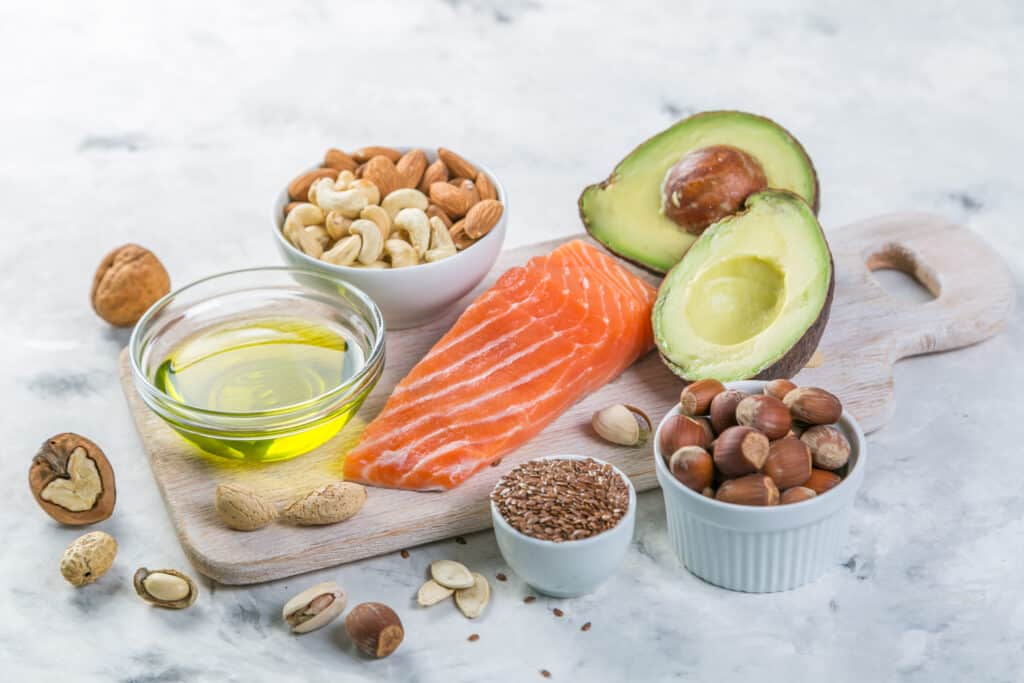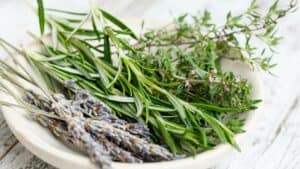

Menopause is a natural transition into old age that is often challenging for women. There are many ways to cope with menopausal symptoms such as hot flashes and low libido. One of the best things you can do for yourself during menopause is to follow a keto diet.
The high-fat, moderate protein and low-carbohydrate diet put the body into a metabolic state known as ketosis where fats are converted into ketone bodies. The diet may be a great way to help with your menopause symptoms. It can relieve mood swings, hot flashes sleep problems, and other common symptoms of menopause that plague menopausal women during this transition period.
But what exactly is it? Read on to understand how menopausal women can benefit from this dietary regimen during their transition through menopause.
Table of Contents
ToggleHow Does Keto Diet Work?
Unlike other diets, the Keto dietary plans work because they force the body into starvation mode, which then causes fat cells to release compounds called “ketones” as fuel. The keto diet works by lowering blood sugar levels with high amounts of healthy fats such as avocado or coconut oil instead of carbohydrates like bread and pasta.
This tricks our bodies’ metabolism into burning more calories than usual while turning off appetite signals. Ketogenic diets are a great way to lose weight and avoid weight gain without giving up on all your favorite foods.
Relationship Between Metabolism and Menopause
As many as fifty percent of women in menopause experience menopausal symptoms and a decrease in their basal metabolic rate during the time leading up to menopausal years. This is primarily due to declining sex hormones as estrogen and progesterone levels drop. This change manifests itself both physically (in terms of body fat distribution) and mentally.
Menstrual cycles also become irregular at this point, and it’s not uncommon to experience weight fluctuations throughout this period.
Is Keto Safe for the Body of a Woman Aged Over 50?
The low-carb and high-fat keto diet is ideal for over 50 years, but they’ll need to mind their protein intake levels and type to avoid muscle loss. The keto diet allows quick slimming for people seeking to lose weight. It’s also a great heart-saver because it balances cholesterol levels and reduces triglycerides, which can harm arteries by 300%.
Research also indicates that the ketogenic diet has the potential to reverse type II diabetes by influencing hormone levels. As such, it’s ideal for fifty-year-olds who have diabetes. However, research has shown that individuals who adhere to the diet can get ‘keto-flu,’ an electrolyte imbalance causing body changes that occur in people on a ketogenic diet.
Is Keto Diet Good for 50-Year-Old Menopausal Women?
Women aged 50 and beyond often get a greater urge to lose weight than 30-year-old women because it’s easier for young women to lose their body weight than 50-year-old women. Women over 50 often experience a slowdown in metabolism and muscle degeneration, making it hard for them to engage in exercises.
Less exercise coupled with muscle degeneration and slow metabolism and the potential to experience high food cravings can make it challenging to control weight for women over 50 years old. Some women, at this age, may also have conditions such as arthritis or osteoarthritis, which can’t allow them to use physical exercise to reduce their weight.
In such cases, the ketogenic diet becomes essential in weight control among women who are 50 years old and beyond. The low-carb and fat-rich diet can help such women control their weight while also reducing high triglyceride levels that harm arteries by choosing the right type of fats for their keto diet.
Moreover, research shows that the increase in healthy fat intake can rein in pain associated with arthritis. The ketogenic diet is also ideal for women with type II diabetes. Research findings also show that the ketogenic diet is beneficial to the brain, and it can improve memory by an estimated 62%.
The high amount of healthy fat taken in the diet can tighten sagging skin and stimulate hair growth – something that every 50-year-old woman would always want to improve in their life.
How to Make Keto Recipes for Menopausal Women
The best ketogenic diets have low carbohydrates and high fats. But to arrive at the ideal recipe, the right type of fat and proteins must be used. Keto diets often lead to weight and muscle loss. In order to keep muscles stable, there is a need to choose proteins carefully to avoid those that increase the intake of unhealthy fats.
Some fats, such as trans fats, are unhealthy because they increase cholesterol or low-density lipoproteins. In 2005, the FDA (Food and Drug Administration) banned the use of trans fats in the manufacturing of foods. Unhealthy fats increase the risk of users getting cardiovascular health problems, including high blood pressure.
Healthy fats are thus the first ingredient in making the right keto diet for any woman. Read on to learn some of the best sources of fats and proteins to use in a keto diet.
What Are the Ideal Fats for Keto Diet?
A proper ketogenic diet should contain adequate healthy fats and less saturated fats, which can increase heart disease risk. It’s ideal to use unsaturated fats, including olive oil, or fats from natural sources such as avocadoes, almonds, walnuts, Brazil nuts, and macadamia nuts.
Other unsaturated fats to consider include fish oil obtained from sardines, salmon, anchovies, and tuna.
What are the Best Protein Sources for Ketogenic Diet?
The excellent sources of high-quality keto proteins are plant-based proteins such as beans, tofu, broccoli, and soy milk. However, it may be challenging to control calories when using plant-based proteins, since most of them have some carbs. The trick is to go for high-fiber plant proteins to achieve a low-carb diet.
If creams and cheese are consumed plenty while on a keto diet, the intake of saturated fats from dairy products will increase drastically. Instead, it would help if they are substituted with low-fat dairy products to get quick weight loss.
Lean meat that is low in saturated fats and fatty seafood with more unsaturated fats and proteins is also ideal source of proteins for those who like meat. The best alternatives include chicken, quail, and rabbit meat.
Does Ketogenic Diet Prevent Weight Gain?
When it comes to weight loss, the ketogenic diet is proving to be a great option for women’s health. In fact, research shows that those who follow this weight management option are able to achieve weight loss faster than when other diets get used.
Health Benefits of Low Carb, High-Fat Diet for Menopausal Women?
The keto diet has many benefits that make it ideal for women in menopause. These include reduced weight gain, improved insulin sensitivity, and diminished cravings for food, which often lead to weight gain.
Menopause also alters the hormone levels in women by reducing progesterone and estrogen. Moreover, insulin sensitivity often reduces during menopause, and this reduction in sensitivity hampers the body’s ability to use its insulin levels properly.
As a result, controlling blood sugar becomes a challenge. But research has revealed that ketogenic meals can better insulin sensitivity and control of blood sugar when insulin levels are ideal.
Apart from balancing progesterone and estrogen levels, the keto-alkaline diet also boosts the sex drive and brain function by altering estrogen production and the levels of sex hormones. The meal also improves sleep, stabilizes energy, and reduces inflammation, which often occurs alongside the hot flashes in menopausal.
Side Effects of a Low-Carb, High-Fat Diet in Menopause Transition
Keto and menopause may work well for women in their fifties and beyond. However, the associated ‘keto flu’ that manifests as the diet users move into ketosis may worsen menopause symptoms, including hot flashes, night sweats, mood changes, and irregular periods.
Besides the worsening symptoms of menopause such as hot flashes, heart disease complications may develop if the keto observer doesn’t use suitable fat types. In essence, the keto diet is beneficial to women in menopause, but it doesn’t provide a one-size-fits-all solution for women in menopause.
Thus, it’s advisable for women who are in menopause and patients to consult their doctors before using this diet. Women can also read any informative blog sites to get health tips on keto dieting.
How to Get the Most out of Keto Diet During Menopause
Adhering to a strict dietary regimen is often a challenge because of the cravings that most people have due to the hunger hormone. But to get the most out of the ketogenic diet, processed foods with high calories must be eliminated first.
Instead, women should go for protein-dense foods that are fiber-rich because when combined with the fat in the keto diet, they get a satiating diet, which limits their carb consumption cravings.
Here are basic tips to help achieve more from a keto diet:
What to Eat?
Ideally, a healthy low-carb and high-fat dietary regimen that offers the best results should have approximately 75% fat, 5% carbohydrates, and 10-30% protein content for each day.
To get the best result, focus on low-carb and foods rich in fats such as low-carb veggies, low-fat dairy products, eggs, and lean meat.
Tracking Caloric Intake
Research has shown that most individuals often underestimate their daily caloric intake. As such, part of the observers of the diet may think they’re consuming less, yet they’re not.
The challenge can be eliminated by using a scale and calorie tracking app, which will help determine how much calorie is consumed.
Consistency
Adhering to a strict dietary regimen is tough for most people, and some may give up along the way. Menopause women who would like to try this meal plan to lose weight or lower insulin resistance can try these insightful tips:
Lifestyle Changes
First, there is a need to change lifestyle to ensure that only keto-friendly food is consumed. Such a move will keep away the temptation of eating what you should avoid.
Partnership with Like-Minded
Pursuing healthy living through diet needs strict adherence and the avoidance of indulgence often encouraged by those around you. Therefore, partner and share ideas and even meals and shopping lists and sessions with those who are keen on following the keto diet to get some encouragement, and tips on how to handle symptoms of menopause.
Prepare for the Keto-Flu and Cravings
Everything comes at a price, and it’s hard to go through such a dieting program without many challenges. Some people may get keto-flu, which may worsen menopause symptoms for those who keto and menopause don’t work well. You may get worse hot flashes and other symptoms.
Even when keto and menopause do go on well for some people, they may still experience cravings, and so they have to get prepared to overcome them.

Final Thoughts on Keto and Menopause
Women don’t have to experience the many symptoms of menopause, including low libido, high weight gain, body mass index, belly fat, hormonal imbalances (progesterone and estrogen levels), hot flashes, mood swings, and other discomforts that come with menopause. Neither do they have to engage in intermittent fasting.
The ketogenic diet can help lose weight while improving sex drive, blood sugar control, brain function, and sleep quality through its impact on hormones. The dietary regimen can also stabilize your energy and reduce inflammation in your body. Embrace ketogenic foods for good health and well-being before and after menopause.
Want to try a full-size product for FREE? Go to hemplily.com/study-2 to learn more.



